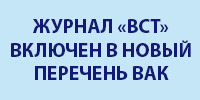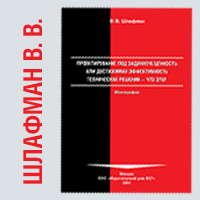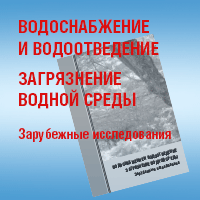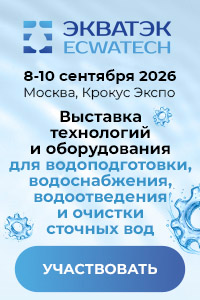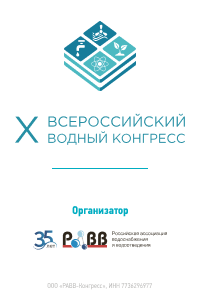№5|2018
WASTEWATER TREATMENT
bbk 000000
UDC 628.54:622.765.431.5
Method of designing a double-chamber flotation machine
with an aeration ejection system with dispersant
Summary
A double-chamber flotation machine with an ejection system with a dispersant is considered. It is demonstrated that the use of a dispersant provides for the multimodal distribution of bubble sizes characterized by several groups. The importance of the correct choice of the process time as one of the most important parameters for the flotation unit design is noted. The method of calculating a double-chamber flotation machine with an ejection system with a dispersant with due account for the specific features of the bubble size distribution and hydrodynamic situation in chambers is proposed. The method of calculating the process time is based on the use of multistage flotation model that presents the distribution of bubbles into several groups depending on the size. The hydrodynamic situation in the chambers is taken into account by the use of equations for perfect-mixing and plug-flow reactors. The calculation of a double-chamber flotation machine with an ejection system with a dispersant for the purification of carwash wastewater was carried out. The results of calculating the parameters of the aeration system, process constants, flotation time and specific geometrical parameters of the flotation machine are presented. The presented case study demonstrates the possible use of the given method for designing the proposed flotation unit.
Key words
wastewater , flotation , ejection aeration system , dispersant , flotation model , flotation time
The further text is accessible on a paid subscription.
For authorisation enter the login/password.
Or subscribe
REFERENCES
- Ksenofontov B. S. Flotatsionnaia obrabotka vody, otkhodov i pochvy [Flotation processing of water, wastes and soil. Moscow, Novye Tekhnologii Publ., 2010, 272 p.].
- Shawwa A. R., Smith D. W. Dissolved air flotation model for drinking water treatment. Canadian Journal of Civil Engineering, 2000, v. 27, no. 2, pp. 373–382.
- Edzwald J. K. Developments of high rate dissolved air flotation for drinking water treatment. Journal of Water Supply: Research and Technology-AQUA, 2007, v. 56, no. 6–7, pp. 399–409.
- Shahbazi B., Rezai B., Koleini S. M. J, Noparast M. The effect of bubble surface area flux on flotation efficiency of pyrite particles. Iranian Journal of Chemistry and Chemical Engineering (IJCCE), 2013, v. 32, no. 2, pp. 109–118.
- Ksenofontov B. S., Antonova E. S. [Study of particle-size distribution of air- and water mixture generated by the ejection aeration system in the process of wastewater flotation]. Bezopasnost’ v Tekhnosfere, 2016, v. 5, no. 4, pp. 38–44. (In Russian).
- Antonova E. S. [Simulation of wastewater treatment process in a flotation unit with an ejection aeration system with a dispersant]. Bezopasnost’ v Tekhnosfere, 2017, v. 6, no. 1, pp. 43–50. (In Russian).
- Smirnov N. N., Volzhinskii A. I. Khimicheskie reaktory v primerakh i zadachakh [Chemical reactors in case studies and tasks: Manual for graduate students. Leningrad, Khimiia Publ., 1986, 224 p.].
- Moskvicheva E. V., Moskvicheva A. V., Ignatkina D. O., Sidiakin P. A., Shchitov D. V. [Kinetic flotation model with the use of mixed chemical based on industrial wastes]. Vestnik Volgogradskogo Gosudarstvennogo Arkhitekturno-Stroitel’nogo Universiteta. Stroitel’stvo i Arkhitektura, 2015, issue 40 (59), pp. 45–57. (In Russian).
- Deriagin B. V., Dukhin S. S., Rulev N. N. Mikroflotatsiia: Vodoochistka, obogashchenie [Microflotation: Water treatment, beneficiation. Moscow, Khimiia Publ., 1986, 112 p.].
- Ksenofontov B. S., Kozodaev A. S., Taranov R. A., Vinogradov M. S., Senik E. V., Voropaeva A. A., Sazonov D. V. [Experience of retrofitting local treatment facilities at carwash]. Ekologiia i Promyshlennost’ Rossii, 2015, v. 19, no. 6, pp. 29–31. (In Russian).


